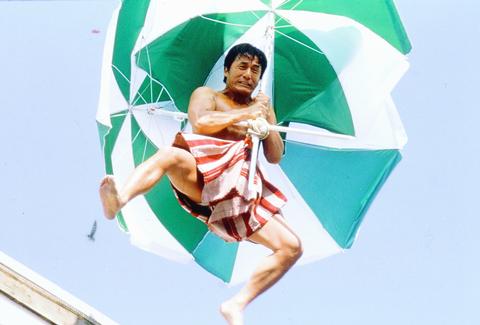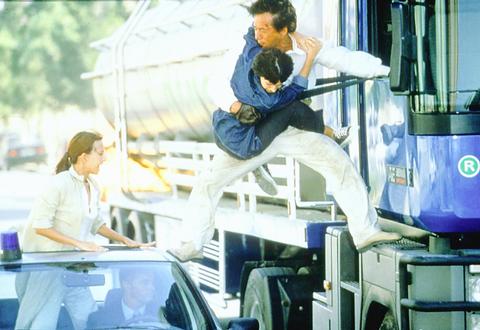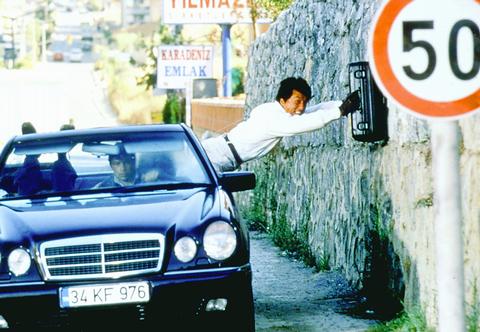For those brought up on his early low budget action flicks, his ascendance to superstardom has done little to improve the quality of his recent pictures, which have ranged from such ill judged cross-cultural collaborations as Rush Hour (1998) to the final degeneration of the Policy Story series in First Strike (1996).

PHOTO: GOLDEN HARVEST
Any film starring Jackie Chan revels in his physical comedy and the highly choreographed fight sequences that few people have been able to match.

PHOTO: GOLDEN HARVEST
But as Chan attempted to ape Hollywood with the truly awful Armor of God -- a slap-stick rip off of the Indiana Jones films -- Chan seemed a spent force as a cinematographic innovator.
It seemed that Chan had spread his resources too thinly, coming up with only the palest imitations of his former success. And then, US critics began to suggest that Chan was losing those lightening fast reflexes that made the first Police Story such a revelation.

PHOTO: GOLDEN HARVEST
Chan's physical humor, which was such an important part of being able to differentiate himself from conventional action heroes like Jet Li (李連杰), seemed to have gone off the rails, most notably with Rush Hour, where it looked like he was content to replay every Chinaman cliche that ever existed.
But with The Accidental Spy, Chan seems to be back in form, with what is probably his best film since Drunken Master II (1994).
Although he hasn't lost his addiction to big budgets and exotic locations -- Spy is set in Turkey -- he seems to have realized that some form of plot and character are necessary to hold audiences for the 110 minutes of the film.
Made at a cost of nearly US$25 million, which is huge for a Hong Kong production, the ostentatious destruction of brand-name products -- not least a BMW motorbike sent crashing into a small airplane, and a chase sequence between a brand-new Benz and an oil tanker in which both vehicles, in addition to a large number of lesser vehicles get totaled on the streets of Istanbul -- are part of the film's main appeal, at least if the promoters are to be believed.
While there is little attempt at character building, some effort is made to give a little color to the cardboard cutouts -- which is all that anyone can ask for in a movie like this.
Chan plays the innocent who gets involved in an international conspiracy, a role he has returned to time and again in recent years.
In Spy he plays the somewhat improbably named Buck, an orphan who inherits clues to a fortune from a dying North Korean defector.
The fortune turns out to be a deal involving a deadly virus, anthrax II.
There are no points for guessing which recent movie this device has been shamelessly lifted from.
In the process of following the clues, Buck becomes involved with Carmen, a CIA agent, and subsequently with Wing, a drug addict and slave to the film's bad guy, Zen.
One of the great strengths of this film is that it was not over dubbed, with Chan showing off his much-improved English skills without being stilted.
The easy shifts between Mandarin, Cantonese and English give the film a spurious realism that may help us overlook the many other highly improbable aspects of the film.
While most people will go and see this film for the truly spectacular stunts -- a fight scene in a Turkish baths and out onto the streets of Istanbul, in which Chan fights off a wide range of toughs while trying to cover his modesty, is a masterpiece of Chan's trademark physical comedy action -- Chan has not neglected to play the socially responsible role model for the young.
As in Crime Story (1993), he continues to preach against drug use, the terrible consequences of which are not unmovingly documented in the character of Wing.
References to, or direct imitation of, Hollywood cinematography is so common in Hong Kong films that it seems churlish to gripe at Chan's attempts to emulate Tom Cruise in a motorbike duel (although, to take it one step further, the opponent is a twin engine airplane), or his extended remake of the bus rescue from Speed, all of which is redeemed by his innovative handling of this extended stunt sequence.
With Spy, it seems, Chan has worked out how to handle the increased resources available to him without smothering his own unique genius.

Cheng Ching-hsiang (鄭青祥) turned a small triangle of concrete jammed between two old shops into a cool little bar called 9dimension. In front of the shop, a steampunk-like structure was welded by himself to serve as a booth where he prepares cocktails. “Yancheng used to be just old people,” he says, “but now young people are coming and creating the New Yancheng.” Around the corner, Yu Hsiu-jao (饒毓琇), opened Tiny Cafe. True to its name, it is the size of a cupboard and serves cold-brewed coffee. “Small shops are so special and have personality,” she says, “people come to Yancheng to find such treasures.” She

Late last month Philippines Foreign Affairs Secretary Theresa Lazaro told the Philippine Senate that the nation has sufficient funds to evacuate the nearly 170,000 Filipino residents in Taiwan, 84 percent of whom are migrant workers, in the event of war. Agencies have been exploring evacuation scenarios since early this year, she said. She also observed that since the Philippines has only limited ships, the government is consulting security agencies for alternatives. Filipinos are a distant third in overall migrant worker population. Indonesia has over 248,000 workers, followed by roughly 240,000 Vietnamese. It should be noted that there are another 170,000

Hannah Liao (廖宸萱) recalls the harassment she experienced on dating apps, an experience that left her frightened and disgusted. “I’ve tried some voice-based dating apps,” the 30-year-old says. “Right away, some guys would say things like, ‘Wanna talk dirty?’ or ‘Wanna suck my d**k?’” she says. Liao’s story is not unique. Ministry of Health and Welfare statistics show a more than 50 percent rise in sexual assault cases related to online encounters over the past five years. In 2023 alone, women comprised 7,698 of the 9,413 reported victims. Faced with a dating landscape that can feel more predatory than promising, many in

Former Chinese Nationalist Party (KMT) chairwoman Hung Hsiu-chu’s (洪秀柱) attendance at the Chinese Communist Party’s (CPP) “Chinese People’s War of Resistance Against Japanese Aggression and the World Anti-Fascist War” parade in Beijing is infuriating, embarrassing and insulting to nearly everyone in Taiwan, and Taiwan’s friends and allies. She is also ripping off bandages and pouring salt into old wounds. In the process she managed to tie both the KMT and the Democratic Progressive Party (DPP) into uncomfortable knots. The KMT continues to honor their heroic fighters, who defended China against the invading Japanese Empire, which inflicted unimaginable horrors on the